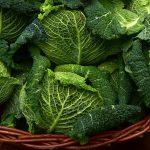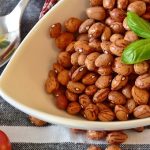Organic foods have grown increasingly popular over the last 2 decades. In fact, U.S. consumers spent $56 billion on organic produce in 2020. This number increased by nearly 13% from 2019, so their popularity does not seem to be slowing down. Some people think organic food is safer, healthier, and tastier than conventionally grown food. Others say it’s better for the environment and the well-being of animals.
What Does “Organic” Mean?
The term “organic” refers to the way agricultural products are grown and processed. While the regulations vary from country to country, in the U.S., organic crops must be grown without the use of synthetic herbicides, pesticides, and fertilizers, or bioengineered genes (GMOs).
Organic livestock raised for meat, eggs, and dairy products must be raised in living conditions accommodating their natural behaviors (such as the ability to graze on pasture) and fed organic feed and forage. They may not be given antibiotics, growth hormones, or any animal by-products.
Organic vs. Non-Organic
Organic
- Grown with natural fertilizers (manure, compost).
- Weeds are controlled naturally (crop rotation, hand weeding, mulching, and tilling) or with organic-approved herbicides.
- Pests are controlled using natural methods (birds, insects, traps) and naturally-derived pesticides.
- Livestock are given all organic, hormone- and GMO-free feed.
- Disease is prevented with natural methods such as clean housing, rotational grazing, and a healthy diet.
- Livestock must have access to the outdoors.
Non-Organic
- Grown with synthetic or chemical fertilizers.
- Weeds are controlled with chemical herbicides.
- Livestock are given growth hormones for faster growth, as well as non-organic, GMO feed.
- Antibiotics and medications are used to prevent livestock disease.
- Livestock may or may not have access to the outdoors.
The Benefits Of Organic Food
How your food is grown or raised can have a major impact on your mental and emotional health as well as the environment. Organic foods often have more beneficial nutrients, such as antioxidants, than their conventionally-grown counterparts and people with allergies to foods, chemicals, or preservatives may find their symptoms lessen or go away when they eat only organic foods.
-
Organic produce contains fewer pesticides.
Chemicals such as synthetic fungicides, herbicides, and insecticides are widely used in conventional agriculture and residues remain on (and in) the food we eat.
-
Organic food is often fresher
Because it doesn’t contain preservatives that make it last longer. Organic produce is sometimes (but not always, so watch where it is from) produced on smaller farms nearer to where it is sold.
-
Organic farming tends to be better for the environment.
Organic farming practices may reduce pollution, conserve water, reduce soil erosion, increase soil fertility, and use less energy. Farming without synthetic pesticides is also better for nearby birds and animals as well as people who live close to farms.
-
Organically raised animals are NOT given antibiotics, growth hormones, or fed animal byproducts.
Feeding livestock animal byproducts increases the risk of mad cow disease (BSE) and the use of antibiotics can create antibiotic-resistant strains of bacteria. Organically-raised animals tend to be given more space to move around and access to the outdoors, which helps to keep them healthy.
-
Organic meat and milk can be richer in certain nutrients.
Results of a 2016 European study show that levels of certain nutrients, including omega-3 fatty acids, were up to 50 percent higher in organic meat and milk than in conventionally raised versions.
-
Organic food is GMO-free.
Genetically Modified Organisms (GMOs) or genetically engineered (GE) foods are plants whose DNA has been altered in ways that cannot occur in nature or in traditional crossbreeding, most commonly in order to be resistant to pesticides or produce an insecticide.
Organic Foods May Contain More Nutrients
Studies comparing the nutrient content of organic and non-organic foods have had mixed results. This is most likely due to natural variation in food handling and production. However, evidence does suggest that foods grown organically may be more nutritious.
Organically Grown Crops Have More Antioxidants and Vitamins
Several older studies have found that organic foods generally contain higher levels of antioxidants and certain micronutrients, such as vitamin C, zinc, and iron. In fact, antioxidant levels can be up to 69% higher in these foods. A 2003 study found that organically grown berries and corn contained 58% more antioxidants and up to 52% higher amounts of vitamin C.
What’s more, one study reported that replacing regular fruit, vegetables and cereals with organic versions could provide extra antioxidants in your diet. This was comparable to eating 1–2 extra portions of fruit and vegetables daily. Organic plants do not rely on chemical pesticide sprays to protect themselves. Instead, they produce more of their own protective compounds, namely antioxidants. This may partly explain the higher levels of antioxidants in these plants.
Nitrate Levels are Generally Lower
Organically grown crops have also been shown to have lower levels of nitrate. In fact, studies have shown that nitrate levels are 30% lower in these crops. High nitrate levels are associated with an increased risk of certain types of cancer. They’re also associated with a condition called methemoglobinemia, a disease in infants that affects the body’s ability to carry oxygen.
Organic Dairy and Meat may have a More Favorable Fatty Acid Profile
Organic milk and dairy products may contain higher levels of omega-3 fatty acids and slightly higher amounts of iron, vitamin E, and some carotenoids.
However, organic milk may contain less selenium and iodine than non-organic milk. These are two minerals that are essential for health.
A review of 67 studies found that organic meat contained higher levels of omega-3 fatty acids and slightly lower levels of saturated fats than conventional meat. A higher intake of omega-3 fatty acids has been associated with many health benefits, including a reduced risk of heart disease.
However, several other studies found no differences. While several studies find that organic foods can have significant positive outcomes, others have found insufficient evidence to recommend organic over conventional.
An observational study comparing the nutrient intakes of nearly 4,000 adults consuming either organic or conventional vegetables found conflicting results. Although a slightly higher intake of certain nutrients was seen in the organic group, this was most likely due to higher overall vegetable consumption.
A review of 35 studies found some positive outcomes associated with organic food but couldn’t draw any definitive conclusion. Another review of 233 studies found a lack of strong evidence to conclude that organic foods are more nutritious than regular foods.
Nevertheless, it is important to remember that these studies vary quite widely in their results. This is because the nutrient content of food depends on many factors, such as soil quality, weather conditions, and when the crops are harvested.
The composition of dairy products and meat can be affected by differences in animal genetics and animal breed, what the animals eat, the time of year, and the type of farm. The natural variations in the production and handling of foods make comparisons difficult. That’s why the results of these studies aren’t conclusive.
Less Chemicals and Resistant Bacteria
Many people choose to buy organic food in order to avoid artificial chemicals. Evidence suggests that consuming these foods may reduce your exposure to pesticide residues and antibiotic-resistant bacteria.
One study found that levels of cadmium, an extremely toxic metal, were 48% lower in organic produce. In addition, pesticide residues were four times more likely to be found in non-organic crops. It is important to note that the higher levels of cadmium and pesticide residue in conventionally grown produce were still well below safety limits.
However, some experts worry that cadmium can accumulate over time in the body, potentially causing harm. Washing, scrubbing, peeling, and cooking food can reduce these chemicals, although it doesn’t always remove them completely. Nevertheless, evidence suggests that the risk of exposure to pesticide residue in foods is small and unlikely to cause harm.
Understanding GMOs
The ongoing debate about the effects of GMOs on health and the environment is a controversial one. In most cases, GMOs are engineered to make food crops resistant to herbicides and/or to produce an insecticide.
For example, much of the sweet corn consumed in the U.S. is genetically engineered to be resistant to the herbicide Roundup and to produce its own insecticide, Bt Toxin.
GMOs are also commonly found in U.S. crops such as soybeans, alfalfa, squash, zucchini, papaya, and canola, and are present in many breakfast cereals and much of the processed food that we eat. If the ingredients on a package include corn syrup or soy lecithin, chances are it contains GMOs.
GMOs and Pesticides
The use of toxic herbicides like Roundup (glyphosate) has increased 15 times since GMOs were introduced. While the World Health Organization announced that glyphosate is “probably carcinogenic to humans,” there is still some controversy over the level of health risks posed by the use of pesticides.
Are GMOs Safe?
While the U.S. Food and Drug Administration (FDA) and the biotech companies that engineer GMOs insist they are safe, many food safety advocates point out that no long term studies have ever been conducted to confirm the safety of GMO use, while some animal studies have indicated that consuming GMOs may cause internal organ damage, slowed brain growth, and thickening of the digestive tract.
GMOs have been linked to increased food allergies and gastrointestinal problems in humans. While many people think that altering the DNA of a plant or animal can increase the risk of cancer, the research has so far proven inconclusive.
Does Organic Mean Pesticide-Free?
As mentioned above, one of the primary benefits of eating organic is lower levels of pesticides. However, despite popular belief, organic farms do use pesticides. The difference is that they only use naturally-derived pesticides, rather than the synthetic pesticides used on conventional commercial farms.
While natural pesticides are believed to be less toxic, some have been found to have health risks. That said, your exposure to harmful pesticides will likely be lower when eating organic.
What are the Possible Risks of Pesticides?
Most of us have an accumulated build-up of pesticide exposure in our bodies due to numerous years of exposure. This chemical “body burden” as it is medically known could lead to health issues such as headaches, birth defects, and added strain on weakened immune systems.
Some studies have indicated that the use of pesticides even at low doses can increase the risk of certain cancers, such as leukemia, lymphoma, brain tumors, breast cancer and prostate cancer.
Children and fetuses are most vulnerable to pesticide exposure because their immune systems, bodies, and brains are still developing. Exposure at an early age may cause developmental delays, behavioral disorders, autism, immune system harm, and motor dysfunction.
Pregnant women are more vulnerable due to the added stress pesticides put on their already taxed organs. Plus, pesticides can be passed from mother to child in the womb, as well as through breast milk.
The widespread use of pesticides has also led to the emergence of “super weeds” and “superbugs,” which can only be killed with extremely toxic poisons like 2,4-Dichlorophenoxyacetic acid (a major ingredient in Agent Orange).
How To Know If You’re Buying Organic
The United States Department of Agriculture (USDA) has set up an organic certification program. This means any farmer or food producer selling organic food must meet strict government standards.
If you decide to choose organic, it’s important to look for the USDA organic seal.
Also, watch for these statements on food labels, so you can identify food that is truly organically grown:
- 100% organic. This product is made entirely from organic ingredients.
- Organic. At least 95% of the ingredients in this product are organic.
- Made with organic ingredients. At least 70% of the ingredients are organic.
If a product contains less than 70% organic ingredients, it cannot be labeled organic or use the USDA seal. Similar standards are enforced in Europe, Canada, and Australia. Each country or continent has its own seal to help consumers identify organic food.
Wrapping It Up
The evidence is mixed on whether organic foods contain more antioxidants and nutrients than conventionally grown food. Consuming organic food may reduce your exposure to artificial chemicals, added hormones, and antibiotic-resistant bacteria.
However, it can cost more and may not be accessible to everyone. Additionally, it’s not clear if going organic has additional health benefits. Whether to buy organic is a choice you should make based on your personal preferences.









